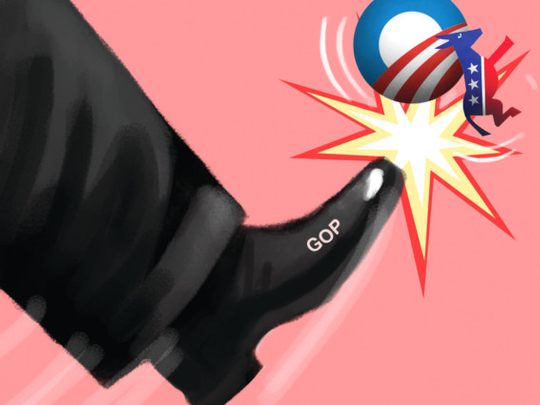
US midterm elections are usually a big deal. In 2006, a Democratic sweep put an end to the high noon of George W. Bush Jr and cleared the path for a Democrat to take the White House two years later. In 2010, the Tea Party surge halted President Barack Obama’s legislative train in its tracks. It has been stuck there ever since. This time, with more than eight weeks before polling day, there is no obvious wave in either direction. Obama is staking all he has on clinging on to Democratic control of the Senate, but his party has no chance of retaking the House of Representatives.
The best to which he can aspire, therefore, is yet another two years of Washington gridlock. Little wonder there is such little public midterm enthusiasm. To most voters, it is one long yawn.
Yet, for Obama, things could be far worse. Should Republicans gain the six seats they need to flip control of the upper chamber, the outcome could make the past four years of bitterly divided government feel like a dress rehearsal.
Nate Silver, the celebrated data cruncher, puts the odds of that happening at 64 per cent. A Republican Senate would give conservatives full control of Capitol Hill and the chance to repeal Obama’s health care law, enact steep budget cuts to his most cherished programmes and generally mess with his legacy. Of course, Obama can veto whatever he wants. But Tea Party activists have been dreaming of such a moment for years. If it turns out that way — and my guess is that it will — it is hard to imagine the party’s leadership restraining them at the leash.
Obama faces three big hurdles. First, there is not much he can do to help fellow Democrats — and a lot he can do to harm their chances. None of his colleagues wants him to appear alongside them on the podium. Candidates in tight races in Louisiana, Arkansas, Alaska and North Carolina have done without his presence and will continue to shun him. Obama’s approval ratings are too toxic. Republicans want to turn the election into a referendum on him. Endangered Democrats, such as Mary Landrieu in seethingly conservative Louisiana, and even Al Franken in relatively liberal Minnesota (should a late wave break the Republican way), want Obama’s cash but not his oratory. The less visible Obama is, the better his party’s odds of retaining control.
This logic is also hobbling his autumn plans. Obama had hoped to issue an order drastically slowing the deportation of illegal immigrants. This would have highlighted Republican intransigence on immigration reform and boosted his standing with Hispanics. Alas, marginal Democrats have pleaded with the White House to hold off until after the election. Obama has little choice but to comply.
Second, events are not helping the Democrats. Last Friday’s relatively tepid jobs growth numbers may have been an outlier in a year where more than 200,000 jobs have been added every month. But even with an improving economy, most Americans do not feel it. In 49 of the past 50 months, the number of those dropping out of the labour force has exceeded the jobs created.
Growth in the US certainly looks good when viewed from across the Atlantic, where Europe is stalling once again. However, Europe’s woes cut no ice on Main Street. A Pew poll last week found that 56 per cent of Americans say their living standards are falling (they are right). Three times as many Americans (24 per cent) think the US economy is shrinking as those who believe it is “growing strongly” (8 per cent). Rising aggregate growth is little use at the ballot box when most voters’ incomes continue to drop.
Global crises are not helping either. Robert Kagan, the neoconservative writer, observes that Obama has been giving voters exactly what they asked for — disengagement from the world’s trouble spots — and they do not like it. The polls are starting to reflect rising unease in public sentiment. Fewer than four in 10 approve of Obama’s handling of foreign policy.
They look around the world at a resurgent Russia, an ebullient China, a Middle East in profound turmoil with a taste for beheading captured American journalists and they worry. Only rarely does foreign policy intrude on congressional elections. In 2006, Democrats capitalised on the unpopularity of the Iraq war to eject Republicans.
In 2014, global chaos may yet help Republicans crystallise Obama’s image as weak and out of his depth. With just 12 legislative days to go before Congress breaks for election recess, Republicans plan to use a lot of it to talk about the Islamic State of Iraq and the Levant (Isil) in Iraq and Syria. More and more voters are starting to listen.
Third, even if Obama gets what he wants — a retained Democratic Senate — it only promises more of the same. John McCain, the sardonic Republican senator, once quipped that it is always darkest just before it gets really dark. The best for which Obama can wish for is that he can use the next two years to prepare the ground for a Democrat to succeed him in 2016. Perhaps Hillary Clinton would have better luck pushing through Obama’s now entirely hypothetical agenda. Certainly, she may be entitled to hope for better than the reception Obama has had.
On a count of bills passed, the outgoing 113th Congress has been the least productive since the 19th century — one political scientist had to go as far back as the ninth Congress (between 1805 and 1807) during the presidency of Thomas Jefferson. Such are the results of partisan gridlock. Obama had hoped for so much more. Now it is the least bad option before him.
— Financial Times











